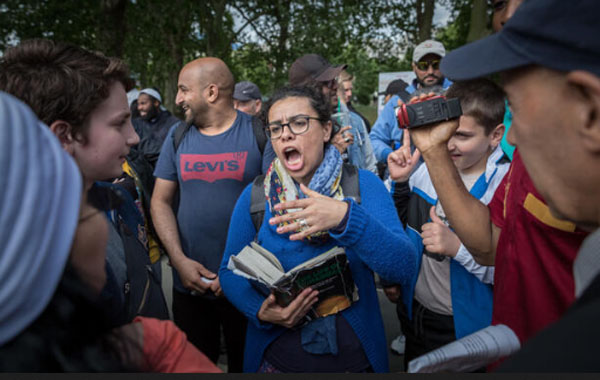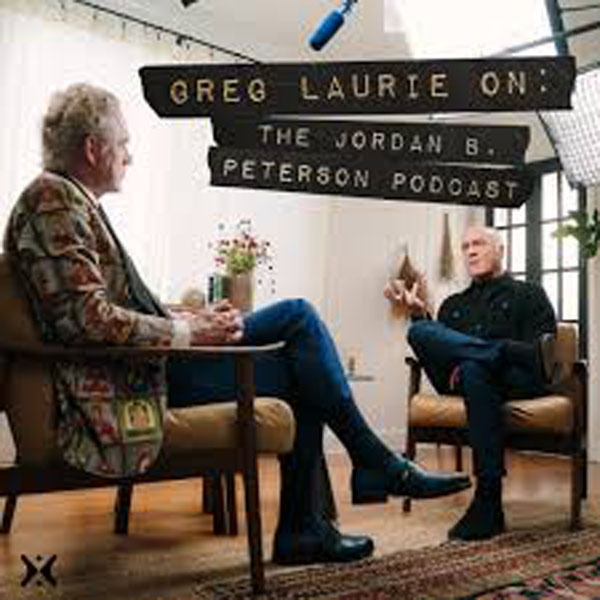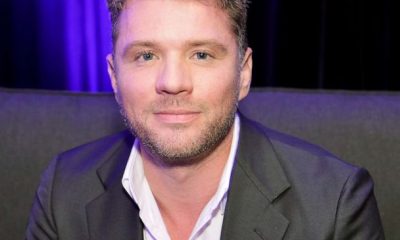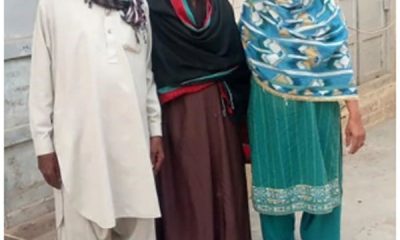us news
The needle in the clock will move one hour forward on March 14 at 2 p.m.

Daylight Saving Time is normally a welcome indicator of longer days, more sunshine, and the shift to spring (save for that whole losing-an-hour-of-sleep thing). But research shows it can actually have adverse effects. In the week following the time switch, the risk of deadly car crashes jumps by six percent due to increased driver drowsiness and darker mornings, a study published in Current Biology found. Additionally, Daylight Saving Time can increase the risk of having a stroke or a heart attack due to sleep deprivation, according to a Vanderbilt University study.
But what about Daylight Saving Time during a pandemic? More people working at home means more flexible sleep schedules sans-commute—so what can we expect when our clocks switch forward come March 14?
Well, first of all, the effects of Daylight Saving Time typically depend on the person, says Sentara sleep medicine doctor Behnam Goudarzi. Typically speaking, your biological clock can adjust itself fairly well to a one-hour time difference, says Goudarzi, adding that folks typically don’t see the effects of jet lag until it hits a three-hour time change.
But that’s not to say that a lost hour of sleep can be totally harmless, says sleep doctor Richard Cho of the Neurology Center of Fairfax. If it results in sleep deprivation, that could lead to serious consequences such as affected thinking and attention spans, risky decision-making, and fatigue, he says. It can also increase mood changes, depression, anxiety, and chronic pain.
So how could the pandemic’s lifestyle changes ease the side effects of Daylight Saving Time? There could be fewer traffic fatalities, for one. Less people are commuting into the office these days, the doctors point out, which means it’s likely that there will be less sleepy folks driving in the dark, and therefore less accidents.
Additionally, longer days with more sunlight means that more people may venture outside compared to the winter, when the WFH life meant folks could go days without leaving their homes. This could make for better snoozing, says Cho: “Getting fresh air, getting natural light, being outside of the home, moving—that improves our energy levels and mood, and helps us get better sleep at night,” he says.
And if you’ve been experiencing pandemic-induced anxiety, depression, or seasonal affective disorder, the longer days could help, too. “Things like depression and all of that should actually get better,” says Goudarzi. “More activity, more light, is generally in favor of a better mood.”
Daylight Saving Time might not be helpful, however, when it comes to helping your pandemic-induced insomnia. “Because you’re getting less light in the morning, that’s translating to more light in the evening time,” says Cho. “And actually, that extra light in the evening time makes it harder to fall asleep at night at what is now your new bedtime.”
If that sounds like you, both doctors encourage working on sleep hygiene: Make sure to avoid excessive light around bedtime, they say, including from screens. A bedtime routine could help, too, such as drinking milk or chamomile tea at night, or taking a hot bath. And it’s important to keep a regular sleep schedule: “Our circadian rhythm and our sleep cycles—they really thrive on routine and consistency,” says Cho. Only use the bed for sleeping, say the doctors—not scrolling through Instagram or taking Zoom calls with the camera off—and try to wake up around the same time each morning.
If you’re particularly worried about Daylight Saving Time knocking you off-kilter, Cho suggests waking up 20 minutes earlier than you normally would over the next two days—when the clock eventually moves a full hour earlier, that will make the transition less abrupt.
us news
16 വയസിന് താഴെയുള്ള കുട്ടികളിൽ സോഷ്യൽ മീഡിയ നിരോധിക്കാൻ യുകെ

ലണ്ടന്: ഓസ്ട്രേലിയക്ക് പിന്നാലെ 16 വയസിന് താഴെയുള്ള കുട്ടികളില് സോഷ്യല് മീഡിയ നിരോധനം കൊണ്ടുവരാന് യുകെയും. ഓണ്ലൈന് സുരക്ഷ ഉറപ്പാക്കാന് തനിക്കാവുന്നത് ചെയ്യുമെന്ന് യുകെ സാങ്കേതിക വിദ്യ സെക്രട്ടറി പീറ്റര് കൈലേയെ ഉദ്ധരിച്ച് ബിബിസി റിപ്പോര്ട്ട് ചെയ്യുന്നു. എല്ലാത്തിന്റെയും രേഖകള് കയ്യിലുണ്ടെന്നും തനിക്ക് ആദ്യം കൂടുതല് തെളിവുകള് ലഭിക്കണമെന്നും അദ്ദേഹം വ്യക്തമാക്കി. യുവാക്കളിലെ സോഷ്യല് മീഡിയകളുടെയും സ്മാര്ട്ട്ഫോണുകളുടെയും സ്വാധീനത്തെക്കുറിച്ച് കൂടുതല് ഗവേഷണം നടത്തുമെന്നും കൈലേ പറഞ്ഞു.
16 വയസുവരെയുള്ള കുട്ടികളില് സോഷ്യല് മീഡിയ ഉപയോഗിക്കുന്നത് നിരോധിക്കുന്നതിനുള്ള നിയമം ലോകത്തിലാദ്യമായി ഓസ്ട്രേലിയ അവതരിപ്പിച്ചിരുന്നു. ഓസ്ട്രേലിയയിലെ കമ്മ്യൂണിക്കേഷന് മന്ത്രി മിഷേല് റോളണ്ട് അവതരിപ്പിച്ച ബില്ല് ഓണ്ലൈന് സുരക്ഷയുമായി ബന്ധപ്പെട്ടുള്ള രക്ഷിതാക്കളുടെ ആശങ്കയ്ക്ക് പ്രാധാന്യം നല്കുന്നു. ബില്ല് പാസായാല് നിയന്ത്രണമേര്പ്പെടുത്താന് ഒരു വര്ഷം വരെയെങ്കിലും സമയമെടുക്കും.
കുട്ടികള് അക്കൗണ്ട് എടുക്കുന്നത് തടഞ്ഞില്ലെങ്കില് സാമൂഹ്യ മാധ്യമങ്ങള് നഷ്ടപരിഹാരം നല്കേണ്ടി വരുമെന്നും ബില്ലില് പറയുന്നുണ്ട്. ഇങ്ങനെ സംഭവിച്ചാല് ടിക് ടോക്, ഫേസ്ബുക്ക്, സ്നാപ്ചാറ്റ്, റെഡ്ഡിറ്റ്, എക്സ്, ഇന്സ്റ്റാഗ്രാം തുടങ്ങിയ പ്ലാറ്റ്ഫോമുകള് 3.3 കോടി ഡോളര് പിഴ നല്കേണ്ടി വരും. സോഷ്യമീഡിയ പ്ലാറ്റ്ഫോമുകളില് സംരക്ഷണം ഒരുക്കേണ്ട ചുമതല കുട്ടികള്ക്കോ മാതാപിതാക്കള്ക്കോ അല്ലെന്നും മൈക്കിള് റോളണ്ട് പറഞ്ഞു. 18 വയസിന് താഴെയുള്ളവർക്ക് ഓണ്ലൈന് പോണോഗ്രഫി നിരോധിക്കാനുള്ള നിയമവും ഓസ്ട്രേലിയ ആലോചിക്കുന്നുണ്ട്.
Sources:azchavattomonline.com
us news
British Evangelist Slashed, Imprisoned, Threatened with Death, Keeps Going

LONDON – An ex-Muslim turned Christian evangelist has been beaten, chased by angry mobs, unlawfully jailed and even stabbed, all for the sake of the Gospel.
This is not in Afghanistan or Saudi Arabia. It is officially happening in Christian Britain.
Her name is Hatun Tash, and what has been done to her has even caught the attention of the British media.
Tash grew up in Turkey as a Muslim and became a Christian after moving to England. And being an ex-Muslim speaking out against Islam has made her a target.
She told us she has changed residences more than 50 times in the past four years because she knows Muslims are looking for her in order to kill her. One man has already been sentenced to 24 years in prison for trying.
Because of this ongoing danger, she asked that we interview her from a secret location.
Tash told us her conversion to Christ began when she learned the truth about Islam and Mohammed.
“As I read biography, it was very disturbing to me. So, the man you grew up to love and honor suddenly turns out to be like, yeah, not good, not good. And I decided, I can’t be Muslim.”
Then she learned about a very different God than the one of Islam, telling us, “As you dig into it, you get to meet with a God who is not silent or far or distant from you, but you meet with a God who loves you, who pours out himself on you. And not only that, He just puts himself on the cross and then says, ‘I love you from everlasting to everlasting, Come to me.'”
Tash began sharing this message to Muslims at Speakers Corner, in London’s Hyde Park, where speakers climb atop stepladders and vigorous debates ensue, often between Muslims and Christians.
Her preaching and criticism of Islam has sometimes enraged Muslims, and three years ago a man slashed her face with a knife. He has never been caught.
She however has been arrested unlawfully more than once. The London Police have twice paid her damages for wrongful arrests, including two years ago when she refused to leave the area where she was preaching. Tash was forcibly marched through Hyde Park, followed by Muslims celebrating her arrest. She was placed in a police van, strip-searched, and jailed.
This has not stopped Tash from going to mosques and sharing the Gospel daily.
“I would simply stand in front of the mosques, and I’d say ‘Muhammad is a false prophet. Jesus Christ is the Son of God. Tell me, what is your objections?’ Hundreds of Muslims just stop and then they want to talk to you. Sometimes you get harmed, sometimes it gets dangerous. Sometimes you end up in hospitals, sometimes you end up in people’s homes for a cup of tea,” Tash said.
“I don’t care whether people reject me or not. They need to hear the gospel,” she said.
Christian Concern’s Christian Legal Centre has defended Tash. Christian Concern’s Andrea Williams told us, “The truth is that those that have attempted to kill her have been caught on camera. The police know who they are, but they have not been arrested. She is feared by and targeted by Muslim groups because she is fearless for the gospel. She loves Jesus so much that nothing will halt her.”
Tash says she will continue to preach and continue to challenge Islam.
“Things are dangerous. Should I choose to stay silent? Like when people are spending 5,000 Pounds to buy a gun, to shoot you and shoot your loved ones? The Gospel is so glorious, I cannot be silent. And the Lord is the giver of life. So, when it’s my time, He will take me home. But until He gives me breath, we continue to preach.”
Sources:CBN News
us news
‘Christ Laid His Life Down for Me’: Greg Laurie Gives Powerful Gospel Presentation to Jordan Peterson

Christian megachurch leader Greg Laurie recently appeared on psychologist Jordan Peterson’s podcast, where he gave the professor-turned-cultural commentator a powerful presentation of the Gospel.
“When everything’s said and done, what’s more important than the afterlife?” the California-based pastor asked Peterson. “What’s more important than where we spend it? According to the Bible, I believe there’s a literal heaven, a literal hell, and I believe we choose in this life where we will spend the afterlife.”
Laurie added he’s going to spend eternity in heaven “not because I’ve lived a good life — because I failed in many ways — but because Christ laid His life down for me on the cross.”
“Coming back to Abraham, and what a picture, the son was willing to go and be sacrificed by the father,” the pastor continued, referring to the Old Testament story of Genesis 22. “[Isaac] knew what was going on: ‘Hey, Dad, where’s the sacrifice?’ ‘My son, God will provide for Himself a sacrifice.’ But Isaac made that sacrifice, too. The Son Jesus made that sacrifice for us, because He knew there was no other way that we could reach God, no other way we could satisfy the righteous demands of God. So Heaven isn’t for good people, as it’s often said; heaven is for forgiven people.”
The conversation between Peterson and Laurie stemmed from the 71-year-old minister opening up about the death of his son, Christopher, who passed away in 2008 as a result of a tragic car accident.
He described that day in July of 2008 as the “worst” day in his life. Nevertheless, Laurie said he is not without hope — because of his faith in the redemptive work of Jesus.
“I believe I’ll see my son again, because he believed in Jesus,” Laurie explained. “He won’t be in heaven because I’m his dad; he’ll be in heaven because he put his faith in Christ and he had that relationship. He’s a part of my future as well, so that gives me hope. But, also, I realize that God can allow these things in our life. I don’t know why. I can’t explain it. I don’t even try to explain it.”
Peterson, author of the new book, “We Who Wrestle With God: Perceptions of the Divine,” admitted to Laurie he struggles to intellectually reconcile a desire to perfect the earthly world with the knowledge the Christian life is heavily weighted toward considering eternity.
The famed psychologist and podcast host asked, “How do you reconcile, in your own mind, the insistence that part of the Christian moral pattern is to perfect the world and to raise the material up to the heavenly with the notion of the afterlife and immortality?”
Laurie referenced 2 Corinthians 12:2-4, in which the Apostle Paul wrote about experiencing a “third heaven,” as well as the thief on the cross next to Jesus, Who promised the man, “Truly I tell you, today you will be with Me in paradise” (Luke 23:42-43, NIV).
The pastor explained he has felt closest to God — and His promises of eternity — through life’s trials.
“God made a lot of promises,” said Laurie. “I’ve put those promises to the test, including the worst thing of all, to lose a child. And I’ve seen how God had come through for me. If He hadn’t come through for me after my son died, I would have given up preaching, for sure. Why carry on? But He came through for me.”
Sources:faithwire
-

 Travel6 months ago
Travel6 months agoയാക്കൂസ കരിഷ്മ:ഓല സ്കൂട്ടറിനേക്കാൾ വിലക്കുറവിൽ കുഞ്ഞൻ കാർ; സിറ്റി യാത്രകൾക്ക് ഇനി ഇവൻ മതിയാവും
-

 Tech4 months ago
Tech4 months agoചിത്രങ്ങൾ എഡിറ്റ് ചെയ്യാം; വാട്സ്ആപ്പിലെ ‘നീല വളയം’ സ്മാർട്ടാകുന്നു, കാര്യമായ മാറ്റങ്ങൾ
-

 National9 months ago
National9 months agoനെയ്തേലിപ്പടി ക്രൂസേഡിന് അനുഗ്രഹീത സമാപ്തി
-

 Movie8 months ago
Movie8 months agoActor Ryan Phillippe ‘Craving’ Relationship With God After Movie About Christian Missionary
-

 National9 months ago
National9 months ago300,000-Member Indian Church to Plant 40 More Megachurches
-

 Movie11 months ago
Movie11 months agoBrazilian gospel singer Pedro Henrique dies of heart attack after collapsing on stage
-

 Articles5 months ago
Articles5 months ago8 ways the Kingdom connects us back to the Garden of Eden
-

 Hot News8 months ago
Hot News8 months ago3 key evidences of Jesus’ return from the grave













